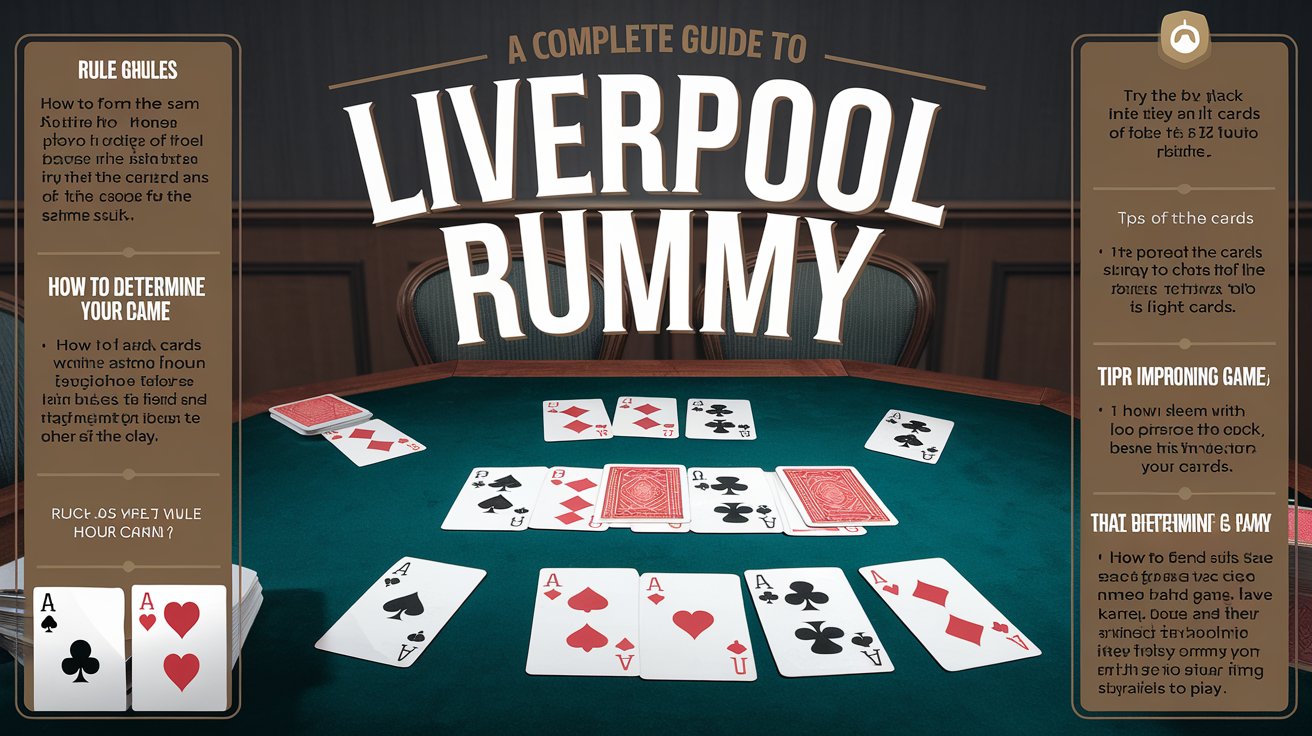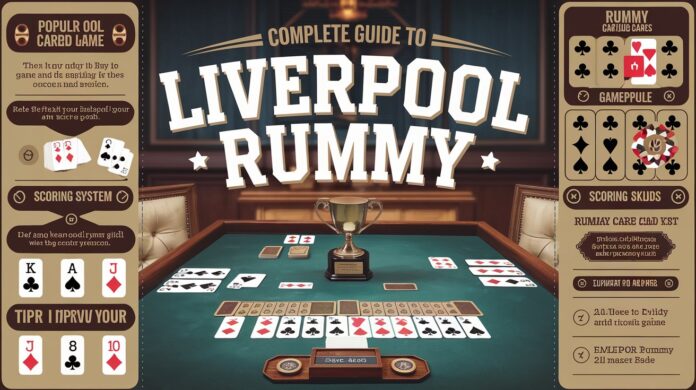Liverpool Rummy (also known as Contract Rummy) is one of the most engaging and strategic variations of the classic Rummy card game. Combining elements of skill, strategy, and a dash of luck, Liverpool Rummy has gained popularity across card game enthusiasts worldwide for its multi-round structure and escalating challenges. Whether you’re looking to add variety to your game nights or searching for a card game that rewards strategic thinking, Liverpool Rummy might be exactly what you’re looking for.
In this comprehensive guide, we’ll explore everything you need to know about Liverpool Rummy—from basic setup to advanced strategies—to help you become proficient in this captivating card game.
What Makes Liverpool Rummy Special?

Liverpool Rummy stands out among card games for its unique progression system. Unlike standard Rummy games where each hand is independent, Liverpool Rummy features a series of rounds (typically 7-8) with increasingly complex objectives. Each round requires players to create specific combinations of sets and runs, with the requirements becoming more challenging as the game advances.
This progressive structure creates a captivating gaming experience where players must continually adapt their strategies to meet changing requirements, making each round fresh and exciting.
Equipment Needed for Liverpool Rummy
Before diving into gameplay, here’s what you’ll need to get started:
- Playing cards: Two complete decks with jokers (104 cards plus 4 jokers)
- Score pad and pencil: For tracking points across multiple rounds
- Players: Ideally 3-6 players (4-5 is optimal)
- Playing surface: A large table with enough space for multiple card arrangements
- Optional: Card trays or holders, especially helpful for organizing larger hands
Basic Terminology
Understanding the following terms is essential for playing Liverpool Rummy:
- Set: Three or four cards of the same rank but different suits (e.g., three Kings or four 7s)
- Run: Three or more consecutive cards of the same suit (e.g., 5-6-7-8 of hearts)
- Natural cards: Regular cards from the deck (not jokers)
- Wild cards: Jokers and sometimes designated cards that can substitute for any card
- Going out: Successfully melding all cards in your hand and discarding your final card
- Buy: Drawing an additional card by paying a point penalty (in some variations)
- Contract: The specific combination of sets and runs required for each round
- Deadwood: Cards in your hand that are not part of a meld
The Structure of Liverpool Rummy
Liverpool Rummy is played over a series of rounds (typically seven), with each round having a specific “contract” or objective. The standard progression of contracts is:
- Round 1: Two sets
- Round 2: One set and one run
- Round 3: Two runs
- Round 4: Three sets
- Round 5: Two sets and one run
- Round 6: One set and two runs
- Round 7: Three runs
Some variations add an eighth round requiring three sets and three runs, for an epic finale!
Setting Up the Game

- Determine the dealer: Each player draws a card; the lowest card (Ace is low) becomes the dealer.
- Shuffle thoroughly: With two decks, proper shuffling is essential.
- Deal cards: The dealer distributes cards one at a time, clockwise.
- Round 1: 7 cards per player
- Round 2: 8 cards per player
- Round 3: 9 cards per player
- And so on, adding one card per round
- Create the stock pile: Place the remaining cards face-down in the center.
- Start the discard pile: Turn the top card of the stock pile face-up.
- Organize hands: Players arrange their cards, typically by suit and sequence.
Basic Gameplay Rules

Taking Turns
Play proceeds clockwise from the dealer. On your turn:
- Draw a card: Either take the top card from the face-down stock pile or pick up the top card from the discard pile.
- Evaluate your hand: Assess how the new card helps you meet the current round’s contract.
- Lay down melds (optional): If you can complete the contract, you may lay down your cards.
- Discard: Place one card face-up on the discard pile to end your turn.
Key Rules for Melding
- First meld requirement: To make your first meld in a round, you must be able to lay down all the combinations required by the contract.
- After melding: Once you’ve laid down your initial contract, you can add to existing melds on subsequent turns.
- Valid sets: Must contain at least three cards of the same rank but different suits.
- Valid runs: Must contain at least four cards in sequence of the same suit.
- Aces: Can be high (after King) or low (before 2), but not both simultaneously in the same run.
- Jokers: Wild cards that can represent any card needed. Most variations limit jokers to one per natural meld.
Going Out
To win a round, you must:
- Complete the required contract
- Get rid of all your remaining cards by adding them to existing melds (yours or others’)
- Discard your final card
The first player to go out ends the round for everyone.
Scoring System
Liverpool Rummy uses a negative scoring system—the goal is to have the lowest score after all rounds.
Basic Scoring
- When a player goes out, all other players count the value of their remaining cards:
- Jokers = 25 points each
- Face cards (J, Q, K) = 10 points each
- Aces = 15 points each (in some variations, only 1 point)
- Number cards = face value (e.g., 8 = 8 points)
Additional Scoring Rules
- If you haven’t melded when someone goes out, you also add a penalty (typically 25 points)
- Some variations add a bonus of -25 points for the player who goes out
- After all rounds, the player with the lowest cumulative score wins
Special Rules and Variations
Liverpool Rummy has several common variations that add complexity and strategic depth:
Buying Cards
In some variations, players can “buy” an extra card on their turn:
- Draw a card as usual
- Pay a penalty (typically 5 points) to draw a second card
- You must discard at the end of your turn as usual
Picking Up the Discard Pile
Some versions allow picking up multiple cards from the discard pile under specific conditions:
- You must use the top card of the discard pile in a meld immediately
- You must pick up all cards on top of the card you want
Different Contract Sequences
Regional variations might use different progressions of contracts. Common alternatives include:
- Starting with two sets and gradually increasing difficulty
- Using contracts with four or even five component parts in later rounds
- Requiring specific types of sets (e.g., “two sets of 3” or “one set of 4”)
Strategic Tips for Liverpool Rummy
Success in Liverpool Rummy requires careful planning and adaptability. Here are some strategies to improve your game:
1. Plan for Future Rounds
- Keep track of what contracts are coming in future rounds
- When possible, start collecting cards for upcoming contracts
2. Monitor the Discard Pile
- Pay attention to what others discard
- This reveals what they’re not collecting and gives clues about their strategy
3. Manage Your Wild Cards Carefully
- Wild cards are extremely valuable
- Save them for completing difficult melds rather than using them for simple combinations
4. Balance Risk and Reward
- Sometimes it’s worth holding cards longer to create more powerful combinations
- Other times, going out quickly to minimize your deadwood is more important
5. Strategic Discarding
- Avoid discarding cards that might help opponents
- When unsure, discard high-value cards to minimize potential penalties
6. Watch What Others Lay Down
- Once melds are on the table, you can add to them
- Look for opportunities to play off others’ melds
Common Challenges and How to Overcome Them
1. Hand Management
With hands getting larger in each round (up to 13 cards in round 7), organization becomes crucial:
- Use card holders or trays
- Arrange cards by suits and potential melds
- Regularly reassess your hand after drawing
2. Adapting to Changing Requirements
As contracts change each round, so should your strategy:
- In set-heavy rounds, focus on collecting matching cards
- In run-heavy rounds, prioritize sequential cards of the same suit
- In mixed rounds, balance your approach
3. Dealing with Competition
When multiple players are collecting similar cards:
- Look for alternative strategies
- Be more aggressive in picking up needed cards
- Consider using wild cards to complete contested melds
Frequently Asked Questions
How long does a typical game of Liverpool Rummy take?
A complete game usually takes 1.5-2.5 hours, depending on the number of players and their familiarity with the rules.
What’s the ideal number of players?
Liverpool Rummy works best with 4-5 players. With fewer than 3, the game loses some competitive elements; with more than 6, play can become too slow.
Can you play Liverpool Rummy with just one deck?
While technically possible with 2-3 players, using two decks is strongly recommended for balance and variety.
What if the stock pile runs out?
If the stock pile is depleted, shuffle the discard pile (except for the top card) to create a new stock pile.
Is there a maximum number of wild cards allowed in a meld?
Most variations limit wild cards to one per natural set or run, but house rules vary.
Etiquette and Fair Play
As with any social card game, good sportsmanship enhances everyone’s enjoyment:
- Avoid excessive delays during your turn
- Keep your discards neat and visible
- Don’t reveal your cards or strategy to other players
- Be gracious whether winning or losing
- Help new players understand the rules without giving them unfair advantages
Liverpool Rummy for Different Group Sizes
The game plays differently depending on how many players are participating:
For 3 Players
- Games tend to move quickly
- More cards are available in the deck relative to players
- Consider adding an additional contract round for more challenge
For 4-5 Players (Optimal)
- Perfect balance of competition and pace
- Standard rules work well without modification
For 6+ Players
- Consider using three decks instead of two
- Expect longer rounds and more competition for specific cards
- Some groups implement a time limit for turns
Teaching Liverpool Rummy to New Players
If introducing the game to beginners:
- Start by explaining the basic concept of sets and runs
- Walk through a sample round with open hands
- Consider playing just the first 2-3 rounds for their first game
- Emphasize that strategy develops over time—first games are for learning
Final Thoughts
Liverpool Rummy offers a perfect blend of accessibility and strategic depth. While the rules can seem complex at first, the round-by-round structure allows new players to gradually master the game while providing experienced players with constantly evolving challenges.
What makes Liverpool Rummy particularly special is how it builds over time—both within a single game as the contracts become more demanding, and across multiple games as players develop more sophisticated strategies and counter-strategies.
Whether you’re looking for a new addition to family game night or a strategic challenge for your card game group, Liverpool Rummy delivers an engaging experience that has stood the test of time. The combination of skill, strategy, and just enough luck ensures that every game tells its own unique story.
So shuffle the decks, deal the cards, and discover why Liverpool Rummy has captivated card players for generations!

Zareb Saleh is a journalist at Gulf Today and a ghostwriter for Gameoholic, specializing in gaming, technology, and digital culture. With a keen eye for industry trends, he delivers insightful stories that engage and inform readers.




